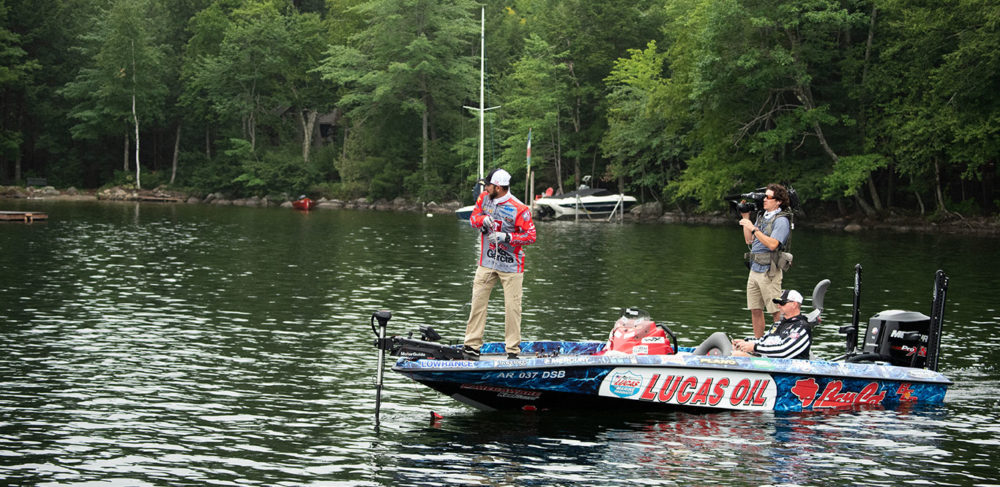PREVIEW: Breaking Down Great Pond with Ike

When a group of Major League Fishing anglers pulls up to a new lake in the northern half of the United States, no one breaks it down quite like Mike Iaconelli. Even on bodies of
So as the day-two group of 10 MLF pros pulls into the Great Pond Public Launch outside of Waterville, Maine for their Elimination Round, Ike is the first one out of the truck to decipher his map verbally.
“I’m not good at recalling lake names, but I generally remember boat ramps and what my first view of a lake looks like,” Ike said. “I can honestly say this ramp and lake does not look familiar to me at all; I don’t think I fished this lake last time.”
“Another thing: looking at this map, this lake is huge and I’m pretty sure I didn’t fish a lake this big when I was in Maine previously,” he continued. “So this one is new to me and that’s not such a bad thing.”
Ike smiles every time Cup events head up north for their August event to fish what he calls “Northern natural lakes,” or “pothole lakes.” He finds an automatic familiarity with them from fishing lakes in Northern New Jersey and in the Pocono Mountains as a kid. It’s that same familiarity that allowed him to win the MLF Cup in Grand Rapids, Minnesota last year.
“They all lay out kind of similar to the lakes that I fished in my childhood,” Ike explained. “They are natural, usually formed by some kind of gorge or pothole in the ground that a glacier scoured out. They are dual species lakes and have both rock and vegetation to support both species. And most of the time they have that slight tannic color water to them. Once I see that combination, I automatically feel comfortable with what I’m faced with.”
Jacob Wheeler was not in the MLF Cup events the last time they visited Maine, so he knows for a fact he has never seen Great Pond before.
“No, this is all new to me,” Wheeler said. “I’m sure I watched the show back when it aired, but I can say I don’t remember the name ‘Great Pond’ sticking out in my head.”
Wheeler agrees with Ike that most of the lakes in this part of the country are similar – but only to a certain degree.
“They are similar in a way, but there are some subtle differences in them that can make a major difference,” Wheeler explained. “Some are flatter and have more silt and vegetation. Some are sandier. Then just a few miles over you might have one that’s much, deeper, steeper and rockier. Some are super clear and others have more of a tannic base to their color: all of that plays into which species is more dominant. And that’s the most critical thing to assess right out of the gate. Some of these guys who have been here before might know this is more of a largemouth pond or more of a smallmouth pond and that gives them a little bit of a head start at lines in. I have no idea which one is more dominant here – or maybe its an even split. But that’s the very first thing I will try to figure out in my ride through.”
Bobby Lane was one of the few pros in today’s group that had been to Great Pond before.
“This ramp and those floating docks over there do look familiar,” he said cautiously while surveying the ramp. “I’m not sure, but I think I’ve been here before.”
After another thoughtful moment, he then tried to shake off any memories. “But you know what, it doesn’t matter whether I’ve been here before or not,” he said boldly, like a coach giving a pep talk in a locker room. “It doesn’t matter who here today has been here before. That was three or four years ago. It’s a different day. What matters now is there are ten guys here and I’ve got to beat four of them to advance and fish another day – it’s as simple as that.”